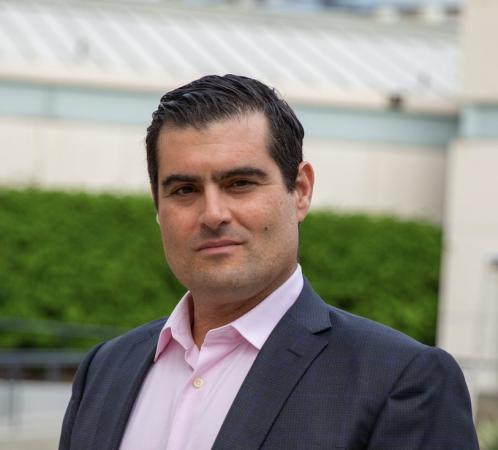 The 2022 Horace Mann Medal is awarded to Brian G. Keating, the Chancellor’s Distinguished Professor of Physics at UC San Diego's Center for Astrophysics and Space Sciences. The Medal is awarded at Commencement to a Brown University Graduate School alum who has made significant contributions in their field. Join us on Saturday, May 28 at 12:30 pm at 85 Waterman Street for his forum presentation, Think Like Galileo Galilei: How to Remain Relevant for Half a Millennium.
The 2022 Horace Mann Medal is awarded to Brian G. Keating, the Chancellor’s Distinguished Professor of Physics at UC San Diego's Center for Astrophysics and Space Sciences. The Medal is awarded at Commencement to a Brown University Graduate School alum who has made significant contributions in their field. Join us on Saturday, May 28 at 12:30 pm at 85 Waterman Street for his forum presentation, Think Like Galileo Galilei: How to Remain Relevant for Half a Millennium.
Keating is currently the principal investigator and director of the Simons Observatory Project Office, which is currently under construction in the Atacama Desert in northern Chile. This observatory will provide scientists a unique opportunity to study the nature of fundamental physical processes that have governed the origin and evolution of the universe. Over 270 scientists, engineers and technologists from over 35 institutions around the world are contributing to the project, making it the world’s largest cosmology collaboration, according to the project’s website.
Using the most technologically advanced instruments of their kind, the Observatory researchers seek to determine the conditions that prevailed in the extremely early universe and potentially detect the presence of an early inflationary expansion event in the Universe, via B-mode polarization due to primordial gravitational waves.
Keating’s “decades of work has led to some of the most advanced technology on the planet designed to detect the faintest signal known in science,” shares nominator and Professor of Physics at Brown, Stephon Alexander.
Prior to his current research efforts, Keating trained as an observational cosmologist at Brown. He worked to design and build the first generation technology and detectors (which would later evolve to become the BICEP experiment) to measure a fundamental pattern of light that would reveal a signal from the Big Bang, known as B-mode polarization. This afterglow of the Big-Bang is known as Cosmic Microwave Background (CMB) radiation.
“Early in his research career, Brian was identified as someone with enormous potential to advance research boundaries in the field of physics,” says nominator S. James Gates, Jr., Ford Foundation Professor of Physics at Brown.
In 2005 he was identified by the National Science Foundation for a Faculty Early Career Development Award, followed by a Presidential Early Career Award for Scientists and Engineers in 2007. Keating has won numerous other awards for his work, including a 2016 appointment as fellow to the American Physical Society.
He was also elected as a lifetime Honorary Member of the National Society of Black Physicists to recognize his ongoing support and mentoring of students and junior faculty from underrepresented groups. At the peak of the pandemic, Keating co-founded the Simons/NSBP scholars program that provides research support and funding for undergraduate physics majors from Historically Black Colleges and Universities. This program is now endowed by the Simons Foundation.
“This mix of top-notch scholarship and outreach is what we are taught to value at Brown and Brian has epitomized these values through the years since his graduation,” shares Alexander.
Another component of Keating’s career has been “his persistent engagement around public outreach to share adventure, fascination, and wonder of science with people not directly engaged in its doing,” says Gates.
Keating’s first book, Losing the Nobel Prize was selected as one of the Best Science Books of the Year at Science Friday, as well as recognized by Amazon, Science News, Physics Today, Forbes, and Symmetry Magazine. Amazon editors also recommend it as one of the best nonfiction books of all times. His second book, Into the Impossible: Think Like a Nobel Prize Winner, is described as a “mesmerizing collection of interviews with some of the world’s brightest minds,” on Amazon.
Keating’s public outreach also includes ongoing presentations to K-12 students, board memberships with Math for America and the San Diego Air and Space Museum, and a trustee appointment at the National Museum of Mathematics. He is currently the host of a podcast series called Into the Impossible, which is one of Apple and Spotify’s top-10 ranked science podcasts.
Prior to receiving his doctoral degree, Keating earned his undergraduate degree at Case Western Reserve University. After his time at Brown, he completed postdoctoral appointments at Stanford University and the California Institute of Technology.